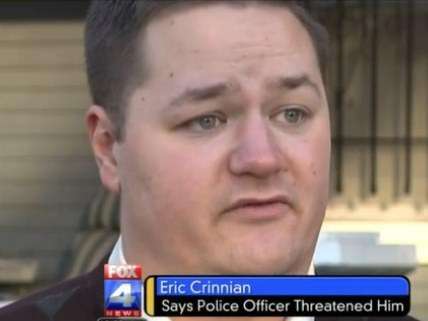Cops: "If we have to get a warrant…we're gonna shoot and kill your dogs"


Eric Crinnian, an attorney in Kansas City, Missouri, says police came to his door looking for parole violators, and got upset when he refused them permission to tramp through his house and paw through his possessions. In fact, he claims, one cop went so far as to threaten to shoot his dogs if he made them abide by the requirements of the law by getting a search warrant to look through his home. Remarkably, a criminal justice professor says the police actions may not be illegal, though they could be awkward in court.
According to Fox 4 News in Kansas City:
Eric Crinnian, a lawyer, heard a loud banging at his door Monday night, he was instantly alarmed since a neighbor's house was robbed a few weeks ago, so he grabbed a crow-bar.
Crinnian said three police officers were outside his house.
"I open the door a little bit wider and he sees that I have something in my hand, so he pulls his gun, tells me to put down whatever I've got and then come out with my hands up, so I do," Crinnian said.
They wanted to know where two guys were, and Crinnian later found out police believed they violated parole.
"I said, 'I have no idea who you're talking about I've never heard of these people before,'" he said.
To prove it, he said police asked to search his house, Crinnian refused multiple times. He said they needed a warrant.
Then he said one police officer started threatening him saying, "If we have to get a warrant, we're going to come back when you're not expecting it, we're going to park in front of your house, where all your neighbors can see, we're gonna bust in your door with a battering ram, we're gonna shoot and kill your dogs, who are my family, and then we're going to ransack your house looking for these people."
The police department is following the usual script, insisting it is internally investigating Crinnian's Office of Community Complaints report, so you can probably safely assume that officials hope this case will fall into the void where most grievances against police go to die. Then again, as a new lawyer and sometime journalist, Crinnian may have a little more recourse than most, and perhaps a better shot at keeping his front door on its hinges.

John Hamilton, an associate professor of criminal justice administration at Park University and a retired Major with the Kansas City, Missouri, Police Department, told the news station that the officers' threats may not be illegal, though they're inappropriate and it's possible they violate department policy. He also pointed to the matter of appearances, saying that such behavior "makes it tenuous when you appear in front of the court in a case like that."
But Jonathan Turley, a professor of law at The George Washington University Law School, isn't convinced that it's legal to threaten to shoot people's dogs and otherwise humiliate them if they insist on the protections of the Fourth Amendment. "It would in my view be a little more than inappropriate and could constitute a crime. While it could be a tough case on this evidence, one possibility would be a criminal threat."
Turley points (accidentally, I think) to a Kansas statute* regarding "criminal threat." But Missouri has a statute that defines a "credible threat…against the life of, or a threat to cause physical injury to, or the kidnapping of, the person, the person's family, or the person's household members or domestic animals or livestock" as aggravated stalking and might fit the bill in this situation. However, that law explicitly exempts law enforcement officers "conducting investigations of violation of federal, state, county, or municipal law," which is more than a little disturbing.
Really? It's OK to threaten people's lives, their family, and their pets if you're a cop?
If it is legal to threaten people with violence if they stand on their rights, it shouldn't be, Turley adds. I'd have to agree.
*Professor Turley revised his post and now contrasts the Missouri and Kansas laws.


Show Comments (194)